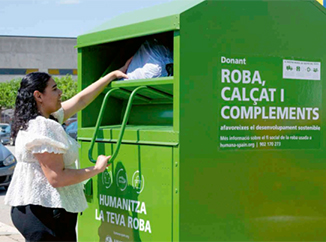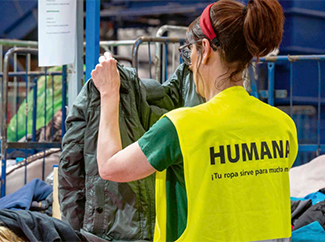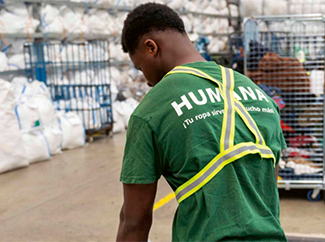consent_cookie
Duración: 1 year
Stores the user's cookie consent state
26-07-2024
From January to June this year, Humana has recovered a total of 6 million garments in Catalonia to give them a second life. The management of this waste has environmental benefits (13,864 tons of CO2 not emitted) and also social benefits (creation of green jobs, execution of development cooperation projects and social programs in the nearest territory).
The management of used textiles is experiencing a key moment, the result of the boost given by the EU Strategy for Circular and Sustainable Textiles and Law 7/2022 of April 8, on Waste and Contaminated Soils for a Circular Economy, which responds to the growing sensitivity of citizens in relation to the sustainability of fashion. The 2,272 tons of textile waste, recovered in Catalonia during the first half of the year thanks to a network of 1,400 selective collection containers, represent an increase of 5.8% compared to the same period of the previous year (2,147 tons) and directly impact the circular and social economy.
Reuse as a key element of the circular economy and the social economy
90% of the clothes thrown away by citizens have a second life thanks to reuse and recycling, key elements for the circular economy and the creation and maintenance of quality jobs. In addition, the management of this waste has prevented the emission of 13,863 tons of CO2 in the first half of the year: this is the carbon dioxide emitted by 5,200 cars that travel 15,000 km each or the amount absorbed by 103,400 trees in one year.
Textile waste (clothing, footwear, accessories and household textiles that are no longer used) is deposited in the 1,400 containers located in easily accessible places, which are emptied periodically (between one and two times a week) to ensure good service. It is then classified at the Humana preparation plant for reuse in L'Ametlla del Vallès (Barcelona).
Environmental commitment, traceability and transparency
“Selective clothing collection has great potential to guarantee a second life: almost 60% can be reused and 32% recycled. The first objective is always reuse because the most sustainable garment is the one that has already been manufactured and has no additional costs or production impact. That is why it is important that the clothes we get rid of are deposited in the appropriate container, because unfortunately almost 90% of textile waste does not end up at the appropriate collection point, but in the trash,” says Rubén Fernández, national promoter of Humana.
“We appreciate the donations from citizens. Selective collection is only successful with the combination of two factors: an environmental commitment on the part of the local administration and a professional and transparent service on the part of the managing entity. Both elements coexist in the territory,” adds the representative of the entity.
Environmental and social benefit
The management of used textiles contributes to the fight against climate change: for every kg of clothing recovered (and which does not end up in a landfill to be incinerated) the emission of 6.1 kg of CO2 is avoided, according to a study by the Federation Humana People to People. The 2,272 tons recovered in Catalonia have avoided the emission of 13,864 tons of CO2.
To this environmental benefit we must add the social one: the creation of green jobs. The entity generates one job in Catalonia for every 18,000 kg of textiles collected. In addition, the resources obtained are mainly destined to the development programs that Humana carries out in the Southern countries with the help of its local partners.
Global data in Catalonia
In Catalonia, each person generates about 22 kg of textile waste annually and only 2.3 kg are selectively collected by an authorized manager such as Humana. This figure represents only 11%. In most households, most textiles are still included in the residual fraction, which translates into a global figure of 147,000 tonnes of textile waste dumped without return in the case of the territory, and 900,000 tonnes in the case of Spain.


